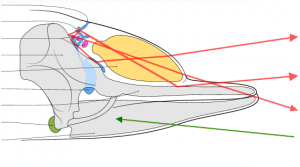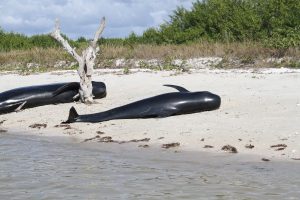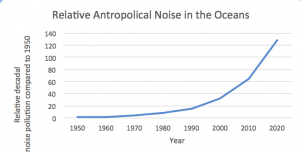Imagine if each time you tried to have a conversation with a loved one, someone came up from behind you and blew an air horn in your ear. Horrible right? Now, try to imagine that that conversation was not just your only form of communication, but is also your directionality and means of obtaining nutrients. I agree, it sounds unbearable and ridiculous. But, this is the kind of struggle that cetaceans, intelligent marine mammals such as dolphins and whales, experience daily from human activities in the oceans.

A basic schematic of how sound travels for echolocation in cetaceans
Have you ever seen a photo of a beached whale bloated and dying? Its hard to admit that theres a good chance that the whale you’re feeling sorry for died because of human ignorance. In the expansive environments of the oceans, sound is vital for survival and is used as the primary source of navigation, long range communication, and food location for cetaceans. When these sounds are interrupted it can have dire effects on the health of the marine environment.

Beaked and pilot whales are common victims of stranding due to noise pollution
Noise pollution is an often misunderstood and under-appreciated form of environmental deterioration. Our activity in the ocean can be so loud that is damages the hearing of cetaceans, even causing organ damage in severe instances. Cetaceans that dive to avoid intense air gun blasts are afflicted with decompression sickness (‘the bends’) and often die from their injuries. Marine mammals are playful, loving, and emotional creatures. We are overlooking our destruction of their habitat for the means of industry and war. Whale populations around the world are decreasing at an alarming rate.
Our influence is destroying parts of the marine environment where cetaceans have thrived for nearly 50 million years. Increased shipping, military sonar, and the seismic search for fossil fuels are sending cetaceans on a rapid path to endangerment and extinction.

Noise pollution has doubled every year since 1950 (plot projected until 2020)
Scientists and environmental activists are working to educate the public on the consequence of noise pollution. Although noise pollution is gaining more international recognition, studies show that minimal action has been taken to restore these delicate marine ecosystems. We must determine the importance of a prosperous ocean and the value of a healthy planet for future generations to advance and replenish. The ocean is indispensable to all life on this planet. The time to act sustainably is now.
Joey Krahn
